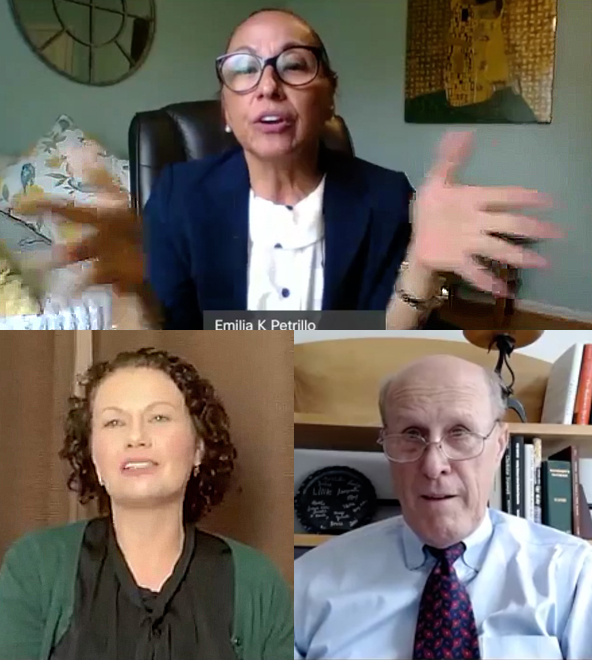September 2020
After months of staying at home, isolated, many college students were excited to get back to campus these past few weeks. For those who did, there was this reality as described by a Notre Dame student: “Knowing that it — COVID-19 — spreads so quickly within close proximity, it’s a little nerve-wracking to be on a college campus.” Another student, at Illinois State University, said, “This is the most anxious I've ever been, I think, in my entire life.”
Of course, a great many students have not gone back to campus, at least not in a regular way. But their anxieties are mounting, too. Having so many online classes is a difficult adjustment for many, even a disappointment. They’re worried about the quality of their education, their job prospects in a world with a crumbling economy, and the terrible impact that economy is already having on their lives.

Student Counseling Center executive director Emilia Petrillo (top) explains a point while the center’s clinical director, Jenna Silverman, and UMB President Bruce Jarrell listen.
Listen to some of these student responses to a California Student Aid Commission survey:
“I am concerned about being unable to pay rent or for other educational expenses.”
“This has added a lot of stress that is distracting me from my academic goals.”
“I may not have the financial means to support myself through the upcoming fall semester.”
Adding to that, many others — particularly the children of immigrants — have taken on more family responsibilities now. Maryorie Delgado, a student at Brigham Young University, describes it like this: “So a lot of just the stress from my family falls on me because basically I am the oldest and I speak the language and my parents helped me out with my tuition. The load of that plus, honestly, going to school, everything shutting down, it’s just like so much stress.”
This persistent anxiety compounds what is already a difficult time for students, particularly those pursuing graduate degrees. Susanna Harris, PhD, is a microbiologist and founder of PhD Balance, a website that provides space for mental health discussions among graduate students. Even in normal times, she told Science magazine, “pursuing a PhD can be extremely isolating,” and missing are those normal stress busters, like going out with friends or family or even on vacation the way you could a year ago.
As a result, about 40 percent of PhD students in a survey conducted by the Student Experience in the Research University consortium reported symptoms consistent with generalized anxiety disorder, and almost that many (37 percent) with major depressive disorder. Even more troubling, in a survey by Active Minds, about half of the respondents said they don’t know where to go to get help.
So, as the pandemic squeezes a cohort of college students already reporting record levels of psychological distress, some universities have gotten creative in their response. Montana State University has appointed a cadre of “graduate student wellness champions” to provide peer-to-peer support. The University of Iowa is allowing emotional support animals in student housing. They already have 12 cats, one dog, one gecko, two hamsters, and one snake.
Many other institutions reportedly are ramping up teletherapy sessions. And just in time, it seems. Kelly Davis, who leads the group Mental Health America’s Collegiate Mental Health Innovation Council, says, “Around October, there tends to be a dip in mental health, and that’s in students who are on campus and not during a pandemic.”
Joining University of Maryland, Baltimore (UMB) President Bruce E. Jarrell, MD, FACS, to discuss this issue and how it affects UMB students on the Sept. 24 edition of his weekly web-based program, Virtual Face to Face with Dr. Bruce Jarrell, were Emilia Petrillo, MSW, executive director of the Student Counseling Center, and Jenna Silverman, PhD, clinical director of the Student Counseling Center.
You can watch the entire discussion, including questions from the UMB community, by following the link at the top of this page.
Search UMB News
Sign up for UMB Alerts.



